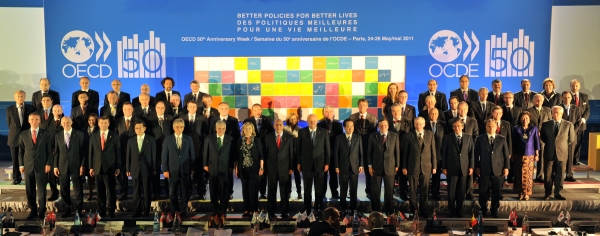OECD Ministerial Council Meeting 2011, Chair’s Summary
|
On the occasion of the 2011 OECD Ministerial Council Meeting (MCM), Leaders and Ministers assembled under the Chairmanship of the United States of America and the Vice-Chairmanship of Germany to celebrate the 50th Anniversary of the Organization and set the OECD on a path that will ensure its effective and influential role in an interconnected world.
The MCM deliberations benefited from the participation of Brazil, India, Indonesia, the People’s Republic of China, and South Africa, as well as the Russian Federation, which is moving forward in the OECD accession process: Ministers look forward to further progress of the accession review of Russia in accordance with the 2007 roadmap.
A New OECD Vision
The Chair presented the Vision Statement (see below), which celebrates the OECD’s history as a forum for policy development and dialogue and looks ahead to its important role contributing to better policies for better lives, implementing a new paradigm for development, and moving toward a global policy network. Ministers representing OECD Member States and the Russian Federation endorsed the Vision Statement and called upon the Council to determine concrete ways to put it into action.
For the past 50 years, the OECD has provided a unique setting where governments can come together to share policy experiences, identify good practices, find solutions to common problems, and collaborate on addressing global challenges. Ministers underscored that the OECD’s core strengths are the high quality of its standards, the objectivity of its recommendations, fact-based mutual learning and its rigorous peer review process. Ministers welcomed the OECDs valuable contributions to the evolving global architecture, including the G20.
Ministers welcomed the Strategic Orientations paper presented by the Secretary-General, which sets out his strategy for increasing the organization’s impact, inclusiveness, and relevance going forward. They also congratulated him on his reappointment as Secretary-General.
Ministers welcomed the invitation for Russia to join the Working Group on Bribery, recognizing this as an important step towards acceding to the Anti-Bribery Convention, a prerequisite for OECD membership. Ministers looked forward to Russia’s early adherence to the Convention and called upon all Working Group members to effectively enforce the Convention.
Ministers adopted the updated OECD Guidelines for Multinational Enterprises, which includes a new chapter on addressing human rights, and encourages enterprises to support cooperative efforts in the appropriate fora to promote Internet freedom. They also adopted the Recommendation on Due Diligence Guidance for Responsible Supply Chains of Minerals from Conflict-Affected and High-Risk Areas.
Ministers also welcomed the establishment of a Center for African Public Debt Management and Bond Markets, supported by the OECD and the Government of South Africa. A Memorandum of Understanding establishing the Center was signed by the representative from South Africa and the Secretary-General.
The Current Economic Situation
The Chief Economist of the OECD presented the Economic Outlook in the public OECD Forum. Recovery from the crisis is proceeding gradually, with recent growth slightly stronger than anticipated. Growth is increasingly self-sustaining, with stimulus support diminishing and private demand picking up. However, challenges remain and new risks have emerged, including rising oil and other commodity prices, inflationary pressures in some emerging market countries, and the after-effects of the tragic earthquake in Japan. Global imbalances persist. The global crisis has left several countries in a position of low potential growth, high unemployment and large public deficits and debt. Ministers committed to maintain vigilance and to implement actions required to sustain recovery and minimize risks.
Ministers recognized that fiscal consolidation plans should be defined and implemented in earnest, taking into account country-specific conditions and the fragility of the recovery. Tax policy reform can play a key role in this effort. Structural reforms can elevate potential growth over the longer term.
Ministers expressed appreciation for the role of the OECD in assisting governments by providing policy advice, sharing best practices, and taking advantage of its expertise in structural reforms and multi-disciplinary analysis. They valued the OECD contribution to the G20, especially in the mutual assessment process, which is addressing the important issue of global imbalances.
Growth, Jobs, Innovation, and Skills
Ministers agreed that the OECD is positioned to play an important role in helping governments to 1) sustain and strengthen the recovery; 2) maximize the job intensity of growth, and; 3) address the chronic challenge of growing inequality to achieve a more equitable and sustainable growth. For the OECD to effectively play its role in the emerging system of global economic governance, the OECD should continue its work in the Economic Outlook and Going for Growth to incorporate analysis of structural measures to promote innovation, regional competitiveness, skills development, and strategies to improve labor markets for the long-term unemployed.
Ministers underscored the priority of job creation and inclusion and noted the need for employment and social policies, including active labor market policies and programs for disadvantaged groups and regions, including unemployed youth. Ensuring an adequate supply of skills and maximizing the use of those skills in the workforce are keys to boosting economic growth and promoting social progress and inclusion. In particular, women represent an underutilized resource and their increased and more productive participation in the labor force would promote growth and poverty reduction. Ministers welcomed the launch of the OECD Skills Strategy, which will provide a framework for identifying and disseminating good practices.
Innovation, supported by a strong intellectual property rights system, is fundamental to creating the industries and jobs of the future. Public policies and structural reforms can foster an environment conducive to innovation and entrepreneurship, which stimulates productivity and growth.
Green Growth
Ministers welcomed the Green Growth Strategy and provided guidance on future work. They agreed that green growth tools and indicators can help expand economic growth and job creation through sustainable use of natural resources, efficiencies in the use of energy, and valuation of ecosystem services. Ministers noted that innovation, supported by a strong intellectual property rights system, is a key to countries’ abilities to achieve economic growth, create green jobs, and protect the environment.
Ministers recognized that the underpinning of the Green Growth Strategy is that economic growth, job creation, and environmental protection are not a zero sum game – sustainable use of natural resources combined with environmental protection can improve the economy. Ministers encouraged the OECD to work further on indicators for green growth. They noted that green growth must resonate with countries at all stages of development and engage a broad range of stakeholders: private and civil sectors, the science community, women and youth. Ministers underscored that green growth policies should be considered within nationally defined contexts and priorities, and be applicable to economic actors of all dimensions, from small organizations to large corporations. Capacity development through education, skills training, knowledge sharing and innovation are essential to achieving green growth. Protecting dislocated workers, is also important for the transition to a green economy.
Women’s Economic Empowerment
The Ministers welcomed the Interim Report of the OECD Gender Initiative, and called on the OECD to continue its work in this area. They called for the Secretary General to take appropriate measures to implement the Way Forward and complete the Gender Initiative by next year’s Ministerial. The ministers also affirmed that women’s economic empowerment is critical to stronger, fairer, economic growth. They called on the OECD to work with other willing international organizations to create a plan to make existing gender data more comparable and useful, and to identify a list of common indicators for future data collection. The Ministers also expressed support for an announcement that the World Bank and UN Women have agreed to work with the OECD on a joint plan for the November 2011 High-Level Meeting on Aid Effectiveness in Busan, Korea.
A New Paradigm for Development
Ministers welcomed a new comprehensive approach to development across the OECD. They endorsed the Framework for an OECD Strategy for Development, which outlines a broader development strategy for the Organization. The goal is to achieve higher, more inclusive, sustainable growth for the widest number of countries. This will be accomplished by greater collaboration and knowledge sharing including sharing policy successes and failures and engaging in mutual learning, as well as deepening partnerships between the Organization and developing countries that want to engage.
Ministers affirmed the new approach will also identify strategies to ensure that the broader policies pursued by our governments are coherent with the desire to promote worldwide development. It will build on the OECD’s rich experience with development cooperation, and incorporate best practices emerging from cooperation between developing countries, including South-South and triangular cooperation.
They agreed the OECD should focus its development strategy on the following areas: innovative and sustainable sources of growth; mobilization of domestic resources for development, including by fostering a favorable investment climate; good governance; and measuring progress for development. Corruption, a lack of transparency, and poorly functioning tax systems are major barriers to long-term growth in many developing countries. They welcomed the establishment of the OECD’s Tax and Development Program, which will assist countries to develop more effective tax systems and combat offshore tax evasion.
Several Ministers suggested these strategic areas should be complemented by work on fostering agriculture and food security. Ministers agreed that recent hikes in food prices have highlighted long-standing challenges in food security and economic development. An increase in global food production and agricultural productivity, and improving the functioning of global agricultural markets and trade are essential. The OECD, in cooperation with partner organizations, is placed to provide analysis and key policy insights building on current horizontal work and on experiences and expertise in developing countries.
Trade and Jobs
Ministers reaffirmed the importance of the multilateral trading system and that this strong, rules-based system is an essential source of sustainable economic growth, development, and job creation. They expressed deep concern regarding the difficulties confronting the Doha Development Agenda (DDA) negotiations, and emphasized the need to seriously review next steps given that the results of the DDA will set the terms of global trade for decades to come. Ministers also renewed their commitment to resist protectionism, and shared the view of the need to refrain from taking WTO-inconsistent measures in the aftermath of recent natural disasters.
Ministers welcomed the International Collaborative Initiative on Trade and Employment (ICITE) as a timely effort to tackle pressing policy concerns. They lent their support to its objective to understand better the mechanisms by which trade affects patterns of employment, and agreed that dialogue and conclusions need to identify policies designed to spread the benefits of trade broadly among workers. Ministers looked forward to an opportunity to consider the ICITE findings in the context of the Meeting of the Council at Ministerial Level in 2012.
In view of the importance of the service sector for domestic economies, and taking into account the prospect of economic benefits from services trade expansion for all economies, Ministers applauded OECD efforts to deepen research on services trade and develop a Services Trade Restrictiveness Index that encompasses key sectors and countries that are, or aspire to be, major services providers. They encouraged the members and the Secretariat to work with the enhanced engagement partners to ensure they also become a part of this important undertaking.
Further information
|
Related Documents


